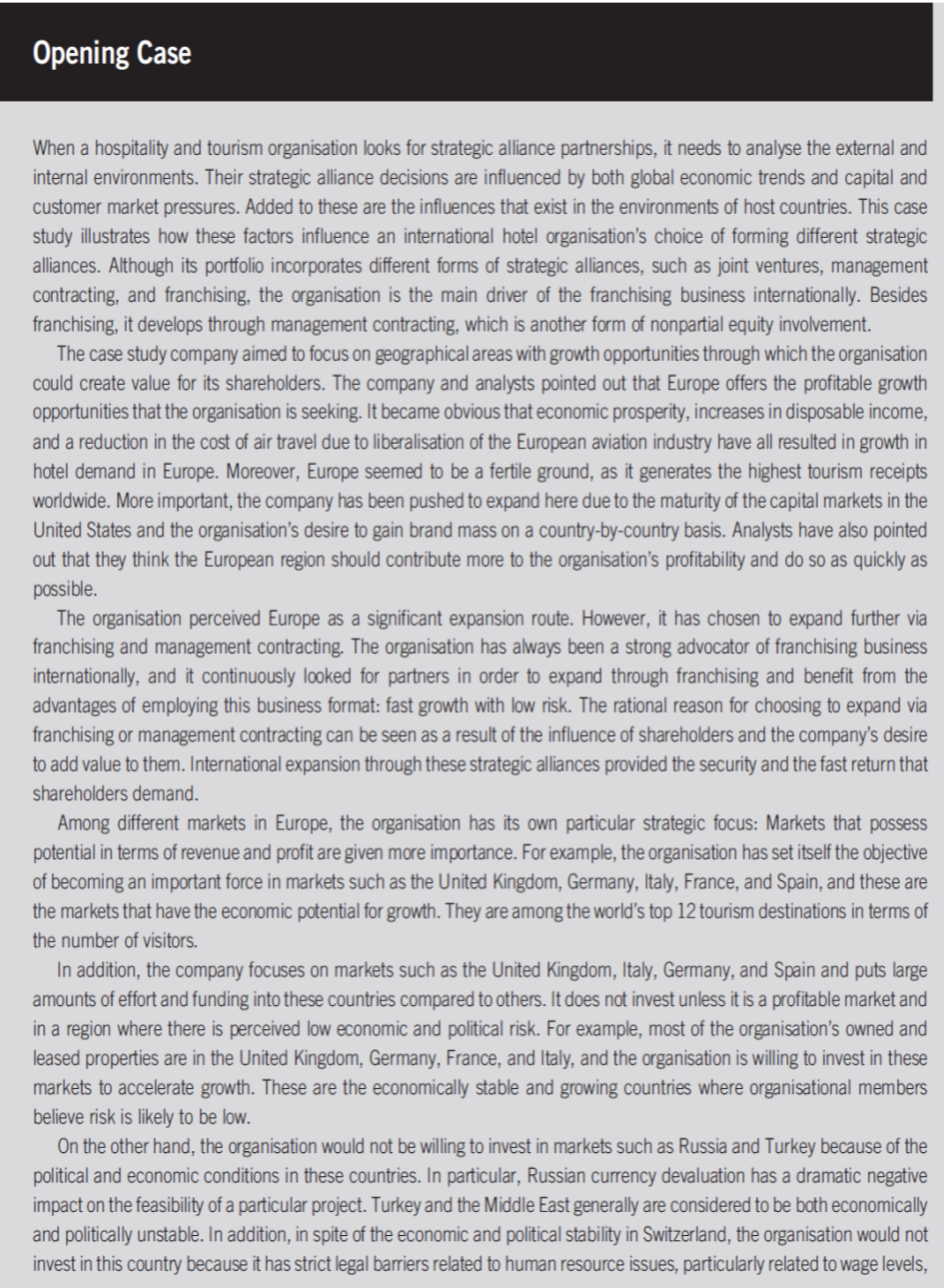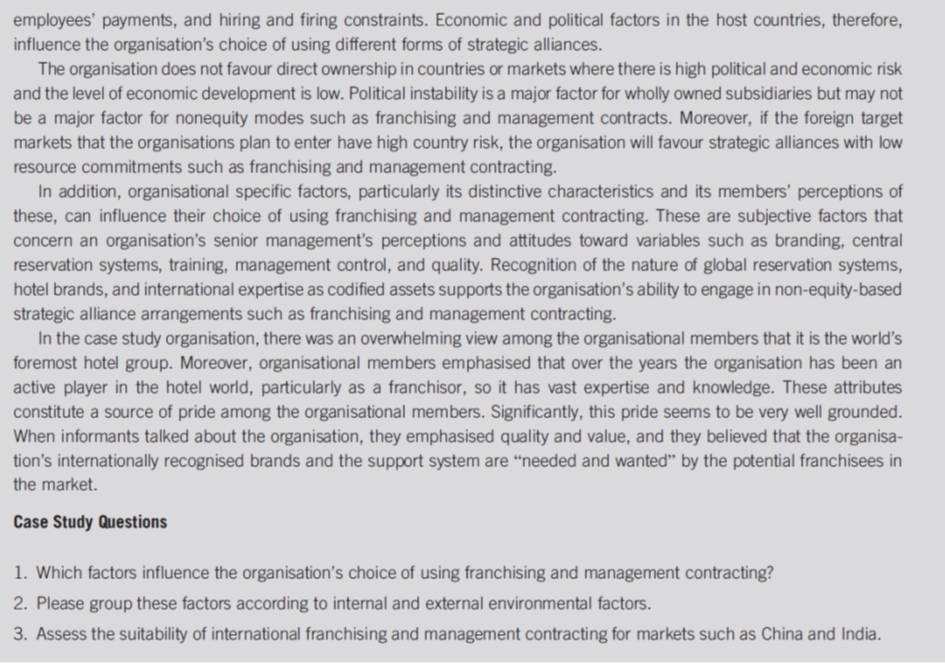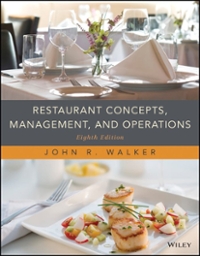Answered step by step
Verified Expert Solution
Question
1 Approved Answer
When a hospitality and tourism organisation looks for strategic alliance partnerships, it needs to analyse the external and internal environments. Their strategic alliance decisions are

 When a hospitality and tourism organisation looks for strategic alliance partnerships, it needs to analyse the external and internal environments. Their strategic alliance decisions are influenced by both global economic trends and capital and customer market pressures. Added to these are the influences that exist in the environments of host countries. This case study illustrates how these factors influence an international hotel organisation's choice of forming different strategic alliances. Although its portfolio incorporates different forms of strategic alliances, such as joint ventures, management contracting, and franchising, the organisation is the main driver of the franchising business internationally. Besides franchising, it develops through management contracting, which is another form of nonpartial equity involvement. The case study company aimed to focus on geographical areas with growth opportunities through which the organisation could create value for its shareholders. The company and analysts pointed out that Europe offers the profitable growth opportunities that the organisation is seeking. It became obvious that economic prosperity, increases in disposable income, and a reduction in the cost of air travel due to liberalisation of the European aviation industry have all resulted in growth in hotel demand in Europe. Moreover, Europe seemed to be a fertile ground, as it generates the highest tourism receipts worldwide. More important, the company has been pushed to expand here due to the maturity of the capital markets in the United States and the organisation's desire to gain brand mass on a country-by-country basis. Analysts have also pointed out that they think the European region should contribute more to the organisation's profitability and do so as quickly as possible. The organisation perceived Europe as a significant expansion route. However, it has chosen to expand further via franchising and management contracting. The organisation has always been a strong advocator of franchising business internationally, and it continuously looked for partners in order to expand through franchising and benefit from the advantages of employing this business format: fast growth with low risk. The rational reason for choosing to expand via franchising or management contracting can be seen as a result of the influence of shareholders and the company's desire to add value to them. International expansion through these strategic alliances provided the security and the fast return that shareholders demand. Among different markets in Europe, the organisation has its own particular strategic focus: Markets that possess potential in terms of revenue and profit are given more importance. For example, the organisation has set itself the objective of becoming an important force in markets such as the United Kingdom, Germany, Italy, France, and Spain, and these are the markets that have the economic potential for growth. They are among the world's top 12 tourism destinations in terms of the number of visitors. In addition, the company focuses on markets such as the United Kingdom, Italy, Germany, and Spain and puts large amounts of effort and funding into these countries compared to others. It does not invest unless it is a profitable market and in a region where there is perceived low economic and political risk. For example, most of the organisation's owned and leased properties are in the United Kingdom, Germany, France, and Italy, and the organisation is willing to invest in these markets to accelerate growth. These are the economically stable and growing countries where organisational members believe risk is likely to be low. On the other hand, the organisation would not be willing to invest in markets such as Russia and Turkey because of the political and economic conditions in these countries. In particular, Russian currency devaluation has a dramatic negative impact on the feasibility of a particular project. Turkey and the Middle East generally are considered to be both economically and politically unstable. In addition, in spite of the economic and political stability in Switzerland, the organisation would not invest in this country because it has strict legal barriers related to human resource issues, particularly related to wage levels, employees' payments, and hiring and firing constraints. Economic and political factors in the host countries, therefore, influence the organisation's choice of using different forms of strategic alliances. The organisation does not favour direct ownership in countries or markets where there is high political and economic risk and the level of economic development is low. Political instability is a major factor for wholly owned subsidiaries but may not be a major factor for nonequity modes such as franchising and management contracts. Moreover, if the foreign target markets that the organisations plan to enter have high country risk, the organisation will favour strategic alliances with low resource commitments such as franchising and management contracting. In addition, organisational specific factors, particularly its distinctive characteristics and its members' perceptions of these, can influence their choice of using franchising and management contracting. These are subjective factors that concern an organisation's senior management's perceptions and attitudes toward variables such as branding, central reservation systems, training, management control, and quality. Recognition of the nature of global reservation systems, hotel brands, and international expertise as codified assets supports the organisation's ability to engage in non-equity-based strategic alliance arrangements such as franchising and management contracting. In the case study organisation, there was an overwhelming view among the organisational members that it is the world's foremost hotel group. Moreover, organisational members emphasised that over the years the organisation has been an active player in the hotel world, particularly as a franchisor, so it has vast expertise and knowledge. These attributes constitute a source of pride among the organisational members. Significantly, this pride seems to be very well grounded. When informants talked about the organisation, they emphasised quality and value, and they believed that the organisation's internationally recognised brands and the support system are "needed and wanted" by the potential franchisees in the market. Case Study Questions 1. Which factors influence the organisation's choice of using franchising and management contracting? 2. Please group these factors according to internal and external environmental factors. 3. Assess the suitability of international franchising and management contracting for markets such as China and India
When a hospitality and tourism organisation looks for strategic alliance partnerships, it needs to analyse the external and internal environments. Their strategic alliance decisions are influenced by both global economic trends and capital and customer market pressures. Added to these are the influences that exist in the environments of host countries. This case study illustrates how these factors influence an international hotel organisation's choice of forming different strategic alliances. Although its portfolio incorporates different forms of strategic alliances, such as joint ventures, management contracting, and franchising, the organisation is the main driver of the franchising business internationally. Besides franchising, it develops through management contracting, which is another form of nonpartial equity involvement. The case study company aimed to focus on geographical areas with growth opportunities through which the organisation could create value for its shareholders. The company and analysts pointed out that Europe offers the profitable growth opportunities that the organisation is seeking. It became obvious that economic prosperity, increases in disposable income, and a reduction in the cost of air travel due to liberalisation of the European aviation industry have all resulted in growth in hotel demand in Europe. Moreover, Europe seemed to be a fertile ground, as it generates the highest tourism receipts worldwide. More important, the company has been pushed to expand here due to the maturity of the capital markets in the United States and the organisation's desire to gain brand mass on a country-by-country basis. Analysts have also pointed out that they think the European region should contribute more to the organisation's profitability and do so as quickly as possible. The organisation perceived Europe as a significant expansion route. However, it has chosen to expand further via franchising and management contracting. The organisation has always been a strong advocator of franchising business internationally, and it continuously looked for partners in order to expand through franchising and benefit from the advantages of employing this business format: fast growth with low risk. The rational reason for choosing to expand via franchising or management contracting can be seen as a result of the influence of shareholders and the company's desire to add value to them. International expansion through these strategic alliances provided the security and the fast return that shareholders demand. Among different markets in Europe, the organisation has its own particular strategic focus: Markets that possess potential in terms of revenue and profit are given more importance. For example, the organisation has set itself the objective of becoming an important force in markets such as the United Kingdom, Germany, Italy, France, and Spain, and these are the markets that have the economic potential for growth. They are among the world's top 12 tourism destinations in terms of the number of visitors. In addition, the company focuses on markets such as the United Kingdom, Italy, Germany, and Spain and puts large amounts of effort and funding into these countries compared to others. It does not invest unless it is a profitable market and in a region where there is perceived low economic and political risk. For example, most of the organisation's owned and leased properties are in the United Kingdom, Germany, France, and Italy, and the organisation is willing to invest in these markets to accelerate growth. These are the economically stable and growing countries where organisational members believe risk is likely to be low. On the other hand, the organisation would not be willing to invest in markets such as Russia and Turkey because of the political and economic conditions in these countries. In particular, Russian currency devaluation has a dramatic negative impact on the feasibility of a particular project. Turkey and the Middle East generally are considered to be both economically and politically unstable. In addition, in spite of the economic and political stability in Switzerland, the organisation would not invest in this country because it has strict legal barriers related to human resource issues, particularly related to wage levels, employees' payments, and hiring and firing constraints. Economic and political factors in the host countries, therefore, influence the organisation's choice of using different forms of strategic alliances. The organisation does not favour direct ownership in countries or markets where there is high political and economic risk and the level of economic development is low. Political instability is a major factor for wholly owned subsidiaries but may not be a major factor for nonequity modes such as franchising and management contracts. Moreover, if the foreign target markets that the organisations plan to enter have high country risk, the organisation will favour strategic alliances with low resource commitments such as franchising and management contracting. In addition, organisational specific factors, particularly its distinctive characteristics and its members' perceptions of these, can influence their choice of using franchising and management contracting. These are subjective factors that concern an organisation's senior management's perceptions and attitudes toward variables such as branding, central reservation systems, training, management control, and quality. Recognition of the nature of global reservation systems, hotel brands, and international expertise as codified assets supports the organisation's ability to engage in non-equity-based strategic alliance arrangements such as franchising and management contracting. In the case study organisation, there was an overwhelming view among the organisational members that it is the world's foremost hotel group. Moreover, organisational members emphasised that over the years the organisation has been an active player in the hotel world, particularly as a franchisor, so it has vast expertise and knowledge. These attributes constitute a source of pride among the organisational members. Significantly, this pride seems to be very well grounded. When informants talked about the organisation, they emphasised quality and value, and they believed that the organisation's internationally recognised brands and the support system are "needed and wanted" by the potential franchisees in the market. Case Study Questions 1. Which factors influence the organisation's choice of using franchising and management contracting? 2. Please group these factors according to internal and external environmental factors. 3. Assess the suitability of international franchising and management contracting for markets such as China and India Step by Step Solution
There are 3 Steps involved in it
Step: 1

Get Instant Access to Expert-Tailored Solutions
See step-by-step solutions with expert insights and AI powered tools for academic success
Step: 2

Step: 3

Ace Your Homework with AI
Get the answers you need in no time with our AI-driven, step-by-step assistance
Get Started


